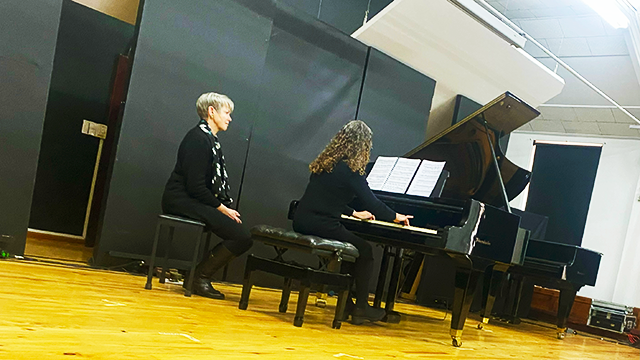
By Siya Hlebani
As the National Arts Festival (NAF) opened its doors to another season of creative brilliance, a performance stood out not only for its musical excellence but for its emotional depth and cultural resonance. Echoes Across Continents: A Musical Journey from Europe to Africa, performed by accomplished pianist and Rhodes University PhD candidate Belinda de Villiers, was a fitting and poignant start to South Africa’s premier celebration of the arts.
Held in the warm and acoustically-rich setting of the Beethoven Room at the Rhodes University Music Department, de Villiers’ performance was more than a concert; it was an artistic bridge across time, geography, and memory. Opening with Beethoven’s radiant Waldstein Piano Sonata, the piece took the audience on a journey from the structural elegance of the European classical canon to the soulful textures of contemporary South African jazz. De Villiers, who is not only a respected solo and ensemble pianist but also an active accompanist and music scholar, brought a deeply personal dimension to the programme. One of the most moving moments came in the performance of Two Jazz Impromptus by South African composer Alexander Johnson. The work, which drew the audience back home to South Africa’s own rhythmic and harmonic sensibilities, served as a tribute to the late Professor Joseph Stanford, to whom the pieces were initially dedicated.
“It’s really poignant that this very week, Professor Joseph Stanford passed away at the age of 83. He was a very prolific pedagogue. Performing these pieces is a fitting farewell,” de Villiers reflected.
The concert closed with Debussy’s Feux d’Artifice, French for fireworks, a dazzling sonic painting of light and sound, which left the audience in a contemplative hush. While the piece’s title may suggest grandeur, de Villiers’ interpretation emphasised its emotional intricacy, a reminder that the arts often speak most powerfully in moments of quiet intensity. While the performance was deeply personal, its impact was widely felt. The audience, composed mainly of Makhanda’s senior citizens, many of whom have ties to Rhodes University and the local arts community, responded warmly.
“I enjoyed every moment. The reception was truly heartening,” de Villiers said after the show. But this performance was more than just a showcase of talent; it exemplified the deeper connection between the National Arts Festival and Rhodes University and the critical role the arts play in the institution’s values.
Rhodes University has long been intertwined with NAF, not just as a host and logistical partner but as a contributor to the intellectual and artistic backbone of the Arts Festival. Many of its alums, staff, and students regularly present work at NAF, using the platform to engage with national and global conversations through creative expression.
The Vice-Chancellor, Professor Sizwe Mabizela, has consistently emphasised the university’s commitment to fostering socially conscious scholarship and community-rooted knowledge production. In this spirit, performances like de Villiers’ are not standalone events; they are part of a broader institutional culture that views the arts as a tool for dialogue, transformation, and human connection.
The alignment between NAF and Rhodes University is also grounded in their mutual aim to engage with the community beyond the confines of academia or performance. The presence of local Makhanda residents at the concert, many of whom have supported the arts for decades, underscores the importance of intergenerational, intercultural engagement. In this space, the arts become a shared language through which complex histories and hopeful futures are imagined.
As South Africa navigates ever-evolving political and social realities, the arts remain essential not only for reflection but for renewal. The choice to begin the Festival with a concert like Echoes Across Continents sends a powerful message: that through music, memory, and meaning, we can continue to draw connections that matter—between people, between places, and between past and present.
In her thoughtful curation of this musical journey, Belinda de Villiers offered more than a performance – she offered a moment of collective pause, of gratitude, and of looking forward. It is this kind of artistry that reminds us why the National Arts Festival and institutions like Rhodes University remain vital to the cultural life of South Africa.
